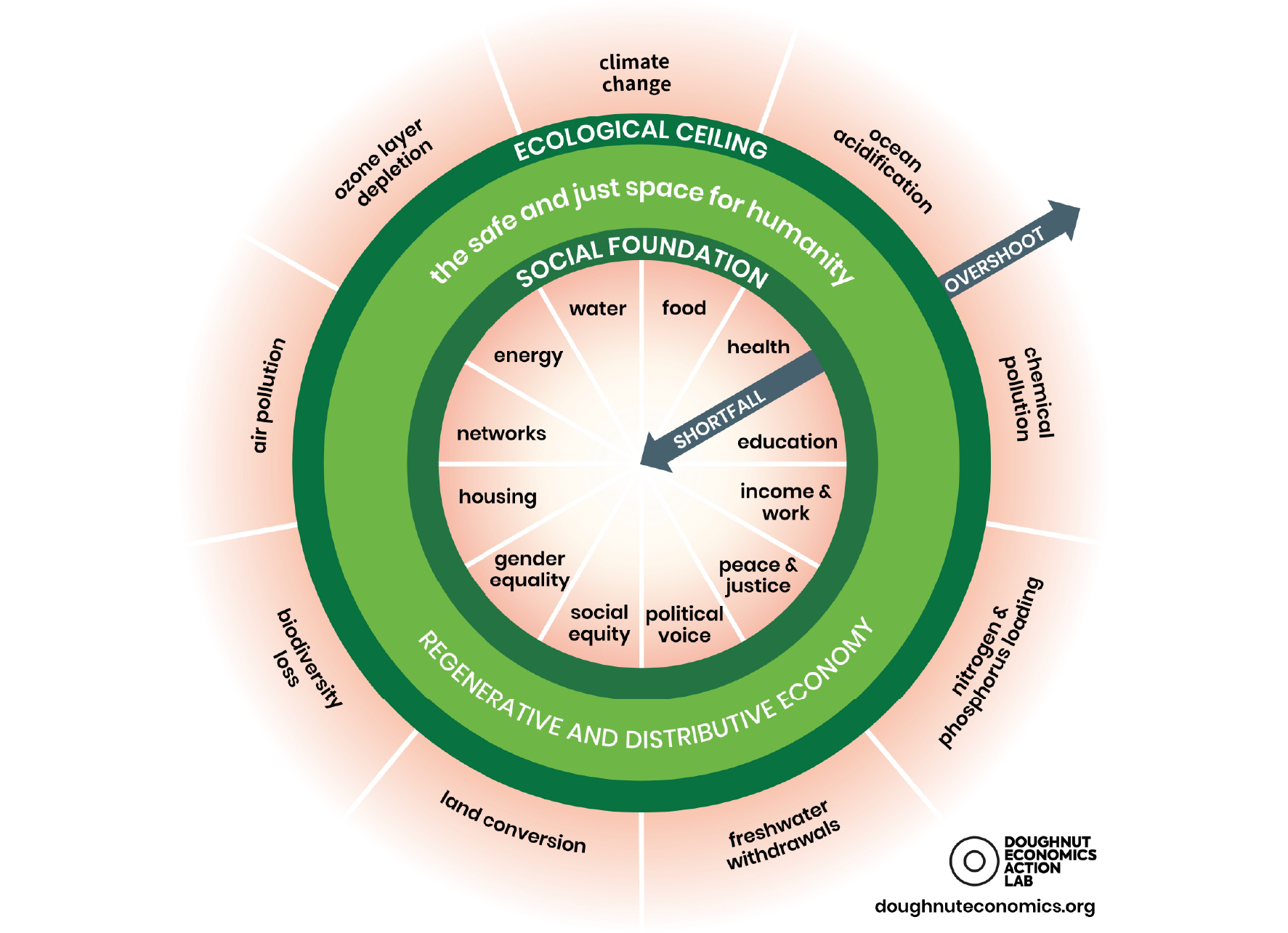
Theory of Change
The Big Problem
We are living in a time of climate emergency and ecological breakdown, coupled with the challenges of deepening social inequity and injustice. We are failing to meet the needs of all, within the means of the planet.
Business as usual and the dominant economic system are leading contributors to the creation of these profound and urgent converging crises we are facing as a species.
Source: Doughnut Economics
Given the opportunity to take leadership, what can Scotland b(e)?
Scotland CAN B’s work is driven by the appreciation that we are living within a unique window of possibility. The choices that we collectively make now in engaging with the challenges we face, will have a profound impact on the lives of many generations to come.
The ring to our name is no coincidence – Scotland CAN B was set up to be aspirational by design. Building on the nods to Scotland’s ‘can do’ attitude of our sister initiative Scotland Can Do and the ‘B’ of our friends in the global B Corp movement; the question of what Scotland can or could b(e) is a continuing and emergent inquiry into what’s possible when an entire nation’s businesses and enterprise support system make a collective commitment to playing their role in securing a fairer, greener, more inclusive and regenerative future for all.
A long-term vision for the role of business in Scotland’s future
“It’s 2030. 12 years ago since a critical mass of pioneering businesses, business support intermediaries, and policymakers began to coalesce around their mutual agreement that it was time for an ‘operating system upgrade’ of the role of business in Scotland. These leaders all agreed; it was time that businesses took responsibility for their vital role in building an inclusive economy which delivers human and ecological wellbeing in a just way, which is aligned with Scotland’s national outcomes and the Global Goals.
Over the last decade, a coherent, cutting-edge nationwide system of business support professionals have been trained and equipped with a national methodology to support, encourage, and enable the integration of this national vision of using business as a force for good.
A national policy of business impact management has meant that over time, all businesses in Scotland have come to fully understand and manage the true impact of their business activities and have adapted their business and governance models to contribute to a thriving Wellbeing Economy.
This process has been supported by the development of a Scotland-specific business impact assessment framework – which helps both businesses themselves, as well as the Scottish government, to track business progress towards delivering the NPF, SDGs, becoming Net Zero, and fulfilling the commitment to creating a fair, low carbon Wellbeing Economy.
Businesses are just another mechanism to support, advocate for and ensure that the needs of all are met equally and fairly, within the means of the planet; ensuring the generations that follow will have the same.
The Scotland CAN B programme is rendered obsolete as a nationwide culture of business impact is embedded across the nation.
The model for place-based economic systems change prototyped, refined, and adopted in Scotland serves as a blueprint and inspiration for other nations and regions around the world to adapt and follow.”
Scotland CAN B is working towards a set of 4 overarching & nested goals to help us get there:
Goal #1:
Scotland’s businesses better understand their role within society and the planet
-
Developing a deep understanding of the role of business in today’s world is an essential starting point, without which none of the other goals hold any importance.
It is by embracing the notion of interdependence that we can begin to appreciate that every business creates impact, for better or worse, affecting everyone and everything around us, directly or indirectly.
Goal #2:
Scotland’s businesses comprehensively measure and manage their ESG performance
-
We have a way to go before each and every business comprehensively measures their performance in relation to the environment, in relation to society, and in relation to their governance arrangements.
Doing so in a way that is lasting and authentic, rather than as a tick-box exercise, will require them to consider their inner workings, to tap into their real motivations as a business, and consider their true purpose.
Goal #3:
Scotland’s businesses measure and manage their contributions towards national & global wellbeing
-
Scotland has stated its vision for the country we want to be in its National Performance Framework, and the Global Sustainable Development Goals are in place, as a roadmap for the decade of action towards 2030.
Business has a vital role to play in realising these national and global goals. To track our collective progress towards them, every Scottish business will need to adopt a common approach.
Goal #4:
Leveraging the role of Scotland’s businesses towards delivering economic systems change
-
There is so much we don’t yet know about how economic systems change will happen, but one thing we can be confident about is that it will involve experimentation, learning and unlearning, getting things wrong to start with, behaviour and mindset change, campaigning, new regulations, and new laws.
So, even if we don’t yet have a precise step-by-step guide for how to get there, it is important to remember what the ultimate direction of travel is for us all.
Informed by this long-term vision and 4 overarching goals:
Scotland CAN B’s Theory of Change
Gathering the required Inputs:
Funding, Mandate
Team, Stewards
Supporting Structures
Knowledge, Resources, Tools
Willing Participants
Working towards tangible Outputs:
A coherent, consistent national approach to business impact measurement and management
Scotland CAN B developed the Impact Journey as a comprehensive, adaptable, and holistic framework to foster alignment in language, mindset, tools, and methodologies used to support business in its role in contributing towards economic systems change in Scotland.
The Impact Journey is disseminated into mainstream adoption through trainings and resources for business leaders, business advisors, and other support intermediaries.
Whilst impact management is not the means to the end, it is a vital building block and mechanism for establishing the culture and capabilities required for business to be a proponent for economic systems change.
A 10% tipping point for cultural change
– a lever within reach
To give ourselves a tangible, consequential target to work towards, Scotland CAN B has embraced Tipping Point theory, inspired by a number of other social change initiatives. Our ambition is that if we meaningfully engage 10% of Scotland’s businesses – 36,410 businesses – with the Impact Journey, and equip them with the purposeful business mindset and impact measurement and management capabilities, then these businesses will influence the majority, and a nationwide culture of business as a force for good will cascade into mainstream adoption and culture.
Working with business advisors and intermediaries is a key strategy for leveraging the multiplier effect towards reaching this critical mass.
Seeking to deliver transformative Outcomes:
A future fit, collective purpose
Imagine for a moment what it would feel like if there was deep alignment and clarity of purpose shared between our Government institutions and policy, the business community, civil society and the support infrastructure that connects it all together about the fundamental role business has to play in creating a fairer, greener future for Scotland. Unleashing the inherent power that sits behind this vision is a key outcome that Scotland CAN B is working towards.
A national culture of purposeful business with commitment to ongoing impact improvement and accountability, for Scotland and the world
Shifting a national business culture is no small task, however, it is a key ambition of our Theory of Change. Understanding our progress towards this outcome throws up some big questions, such as: what constitutes a purposeful business? and, how do we track and evidence a true culture shift towards business impact accountability? Our answers to these questions are still taking form, but as we dig deep into our work of fostering Impact Culture and designing and delivering trainings on the Impact Journey in the meantime, we have no doubt that there will come a time soon when corporate governance reform and business impact accounting regulation will rise to meet us, and we’ll look back and find it hard to believe that there was a time when businesses didn’t take ownership of their social and environmental impacts.
Find out more about the Better Business Act – the campaign to change the UK law to ensure every company in the UK aligns their interests with those of wider society and the environment.
A fundamental business mindset shift towards appreciating our interdependence
A cornerstone of the work involved is to truly embrace and help our stakeholders absorb the principle of interdependence in the way we do business in Scotland: the recognition that it makes no sense to behave only as if our businesses are discrete and autonomous entities, disconnected from the wider systems within which they operate, when in fact the opposite is true; we depend entirely upon each other and the natural world, as part of the incredible interconnected web of life on planet Earth.
Source: Interdependence as illustrated by the SDG ‘Wedding Cake’ diagram
A blueprint for other nations, regions, systems, and places to follow
From the very outset of Scotland CAN B we believed that implementing this work successfully in Scotland would pave the way for friends in other places to follow suit. We are paying careful attention to the factors involved in the systems change we are invested in catalysing, so that others can benefit from what we have learned. The urgent and sweeping changes required to move towards a more just and regenerative future are no small undertaking and Scotland CAN B is committed to contributing our experiences and lessons learned to help streamline and accelerate this work around the world.
A note, on planned obsolescence →
The Scotland CAN B programme exists to serve a unique purpose. There is a plan in place to achieve this purpose, and agreed mechanisms to help us track our progress towards delivering it over time.
When the time comes, when a nationwide culture of using business as a force for good is a lived experience in Scotland, and when Scotland’s businesses are celebrated as key contributors towards the nation’s thriving Wellbeing Economy; the Scotland CAN B initiative will have served its purpose, and it will be time to close up shop and retire the programme.
We will welcome this moment when it comes, and look forward to the sense of a job well done – but until then, in the meantime – let’s get to work.






















